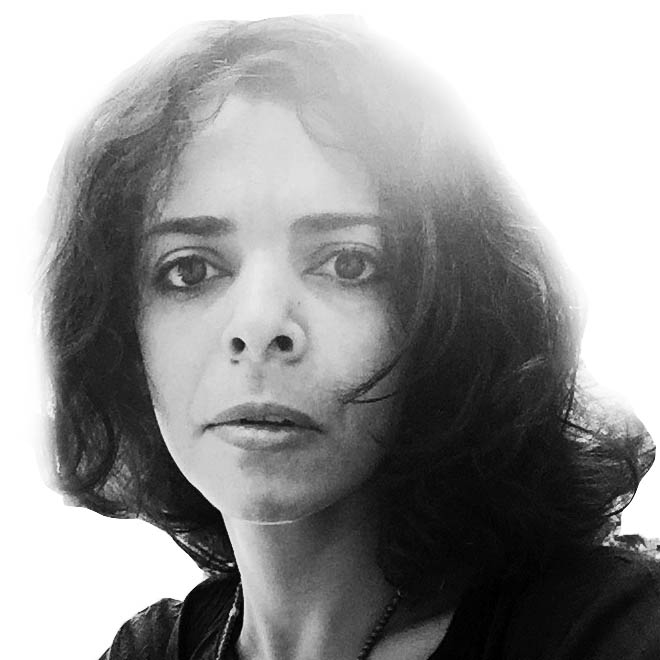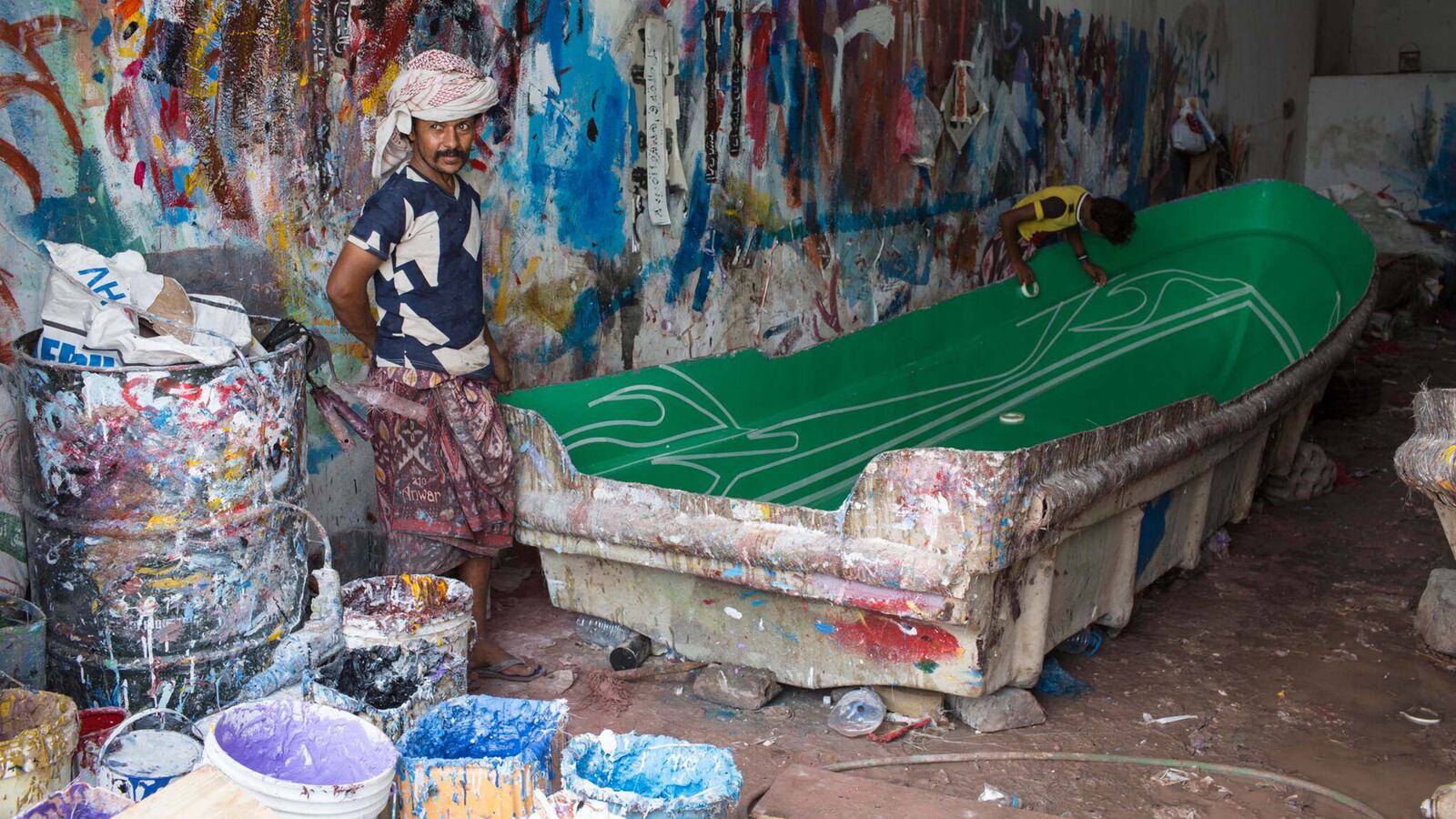Despite its name, the port city of Mocha on the Red Sea coast of Yemen doesn’t offer coffee blends or sea resorts. Once one of the world’s maritime centers and filled with riches from around the world, today most would be hard-pressed to point to it on a map.
Yet in the 17th century, Mocha, was a major trade center under the Ottomans and the focal point of Yemen’s 200-year trade monopoly over the global coffee trade. Then, in 1616 the city was dealt its first death-blow. The Dutch merchant Pieter van den Broecke managed to sneak coffee plants out of Yemen, which would eventually break the city’s stranglehold on the market. Then, when the British took the city over in 1839, they made the competing port of Aden their primary harbor. The ensuing century and a half would see the city slowly slip into obscurity.

The historic mosque of Al-Shazly, and remains are seen of the destruction of the shrine annexed to the mosque by salafi members of the troops
Courtesy Asmaa WaguihNowadays Mocha has a major role again, this time in the ongoing conflict in Yemen between Iran-backed Houthi militias and forces loyal to the government of President Abdrabbuh Mansur Hadi, backed by the Saudi Arabia-led coalition. As the civil war has raged, the city has also served as a major center of smuggling—of goods and people.
Houthi militias took over Mocha during their military offensive in March 2015, but pro-Hadi troops won the town over in early 2017. Now Mocha is a main base for all troops fighting the Houthis on the west coast (theon the Red Sea side) of Yemen.

Local tribal members of Mocha chew qat, a plant grown in Yemen and known for its addictive leaves , as they visit the tribal Sheikh of the city in the afternoon
Courtesy Asmaa WaguihMocha is where the central command for the UAE’s operations is location, and the coalition is in control of the port. In addition, all three different forces that the coalition are backing: (Southern Brigades, forces of nephew of former Yemeni president, and the Tihama brigades), have their main military bases in Mocha.
When I visited Mocha in May of 2018, and before checking in one of the two hotels found in the city, I was hosted for a few days by Afrah, a woman from Mocha, who is married to a member of the troops from Aden. Her house is located in the old city where some of the modern houses are surrounded by old dwellings that look smashed from previous wars. .
Walking through the city, it's hard to imagine this place as a major port through different times in the last few centuries. Both the local market for food and the fish market look quite ancient as if it has been hardly changed since the days centuries ago when Yemen was difficult to control because of its remoteness and tribal character.

Workers who would be working in smuggling sleep by their boats at the outskirts of Mocha before away from military check points
Courtesy Asmaa WaguihIt was difficult to see the historical city's landmarks, but some were attainable. The historic mosque of Al-shazly (named after Sheikh Ali Ibn Omar al-Shazly) has been standing for nearly 500 years. According to legend, the Sufi Sheikh, Al-Shazly, returned from Ethiopia with the knowledge that coffee promoted awareness; a great privilege for worshippers in the Sufi order. Hence members of his Sufi sect spread out the coffee drinking through the Islamic world. The shrine annexed to the mosque that was built for the Sufi sheikh has been destroyed by the Salafi members of the troops when they entered Mocha. (Salafis don't believe in shrines that could lead people to worship religious sheikhs). Other few old mosques built during the Ottomans have mostly survived in Mocha.
So too is it hard to find in the city traces of the heydays when Yemen’s Arabica coffee was transferred from here to all over Europe. Not from storehouses built when Mocha was said to be a transit for goods between the Mediterranean and south east Asia. Nothing has been left out of the palaces that accommodated the rich tradesmen. Nothing seems to record the city’s rise and fall.
Some locals talk about the huge flood of the 1940s that easily washed away many buildings in the city after the destruction that has already taken place in earlier wars between the century’s big powers over the region. Some think it was heaven's punishment after extravagance of the rich tradesmen who “were drinking alcohol from cups made of gold.”

A member of pro-government forces that are based in Mocha is seen near by a market area.
Courtesy Asmaa WaguihLuckily, I met with a history researcher from Mocha at the house of the local tribal sheikh of the town. The sheikh and his visitors were chewing qat, a plant grown in Yemen and known for its addictive leaves; usually a habit that starts after lunch. “The coffee was like gold for us, or like ‘oil’ in the Gulf,” the researcher, Adel Hussein, told me.
“The coffee beans were not planted in Mocha, but in the northern highlands of Sanaa and around, then they used to be collected in Beit al Faquih area, in Al-Hudaydah, and then tradesmen would transfer it to Mocha by camels and then export it from here to the rest of the world”
But those were the days! Hussein has obtained copies of old studies on the city that capture its demise at the hands of multiple wars, notably the Italian campaign on the Ottomans in 1911 and the British one during the first World War that left the city as “if was hit by an earthquake.” During the years that followed the Ottomans, especially during the rule of the Zaydi Imams, qat plantation started to grow. “It's more profitable for tradesmen than coffee throughout the country,” he explained.

A man cuts fish in the fish market in Mocha
Courrtesy Asmaa WaguihI was also told that although some point to former president Ali Abdullah Salih (1990 to 2012) building major roads and helping uplift the education, that during his time Mocha was reduced to merely a smuggling center for good and refugees through the sea. While the smuggling activity has shrunk since the area became a military zone for the Coalition (with some of it moving to Shabwa on the Arabian Sea), for years now boats came from the horn of Africa full of African migrants.
But Mocha has troubles of its own. The washed away houses near Afrah’s place are getting used by the displaced Yemenis from the recent war. Many of them are waiting for the fighting to be over to return to their villages in nearby cities.
Fishing and boat building remain major surviving crafts in Mocha. But also as I've seen with Afrah's family, many young men have joined the troops to get a decent salary.
In front of a military base near the main hospital looking over the coast, some fishermen sitting by their boats resting after work told me not to take pictures because it's close to the base. The coast seem empty of people, as Afrah's mother was telling me that families don't go to the beaches like before. Some children go for a swim in some areas, and also some soldiers, but some beaches are avoided as it could still have some land mines left over from the last few years' conflict.
It's rather Afrah's mother and even her grandmother who spoke well of the past where many families used to spend time by the beaches and when Mocha was full of palm trees that are now just a few.
After hearing about the destruction of old and recent wars in addition to the flooding, it's easy to believe what Afrah's mother said: that not many of the original people from Mocha are left. Many departed the city to search for better life elsewhere, such as the man I met returning from Djibouti to visit the family. Today, around 90 percent of the inhabitants in Mocha are are not from the city; mostly members of the different troops in addition to the displaced.
I've checked if coffee is still popular to drink as in the capital Sanaa, but it didn't seem that it's the case. People were drinking tea everywhere. Afrah's mother mixes the coffee with herbs as a medicine. I was told that at sweet shops, coffee is served for free to soften the sweet taste. At restaurants, the coffee doesn't exist, let alone that as a woman, I don't have a space in the local men-only-customers coffeehouses.
I left Mocha without drinking coffee.






